(1) Baranov, M.; Polin, L.; Leffler, N.; Leitus, G.; Shames, A. I.; Weinstock, I. A.* "All-inorganic ferric wheel based on hexaniobnate-anion linkers", Dalton Trans., 2022, 51 (22), 8600-8604.
.bmp)
(2) Tiwari, C. K.; Baranov, M.; Neyman, A.; Neumann, R.; Weinstock I. A.* "Selective Oxidation by H5[PV2MO10O40] in a Highly Acidic Medium", Inorg. Chem., 2020, 59 (17), 11945-11952.
Highlighted on the cover of the Journal:

(3) Zhang, M.; Hao, J.; Neyman, A.; Wang, Y.*; Weinstock I. A.* "Influence of Polyoxometalate Protecting Ligands on Catalytic Aerobic Oxidation at the Surfaces of Gold Nanoparticles in Water", Inorg. Chem., 2017, 56 (5), 2400-2408.
Highlighted on the cover of the Journal:
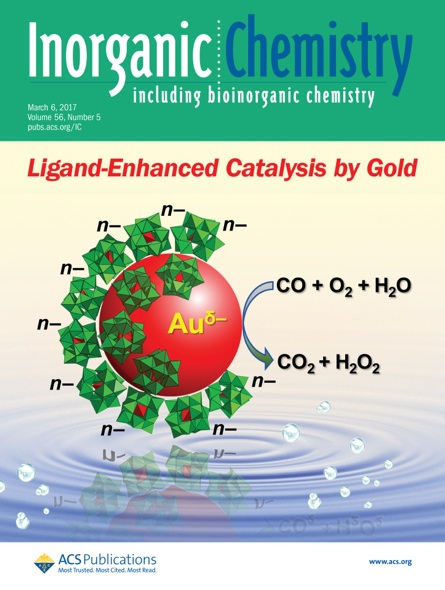
(4) Kopilevich, S.; Gil, A.; Garcia-Ratés, M.; Avalos, J. B.; Bo, C.; Müller, A.; Weinstock, I. A.* "Catalysis in a Porous Molecular Capsule: Activation by Regulated Access to Sixty Metal Centers Spanning a Truncated Icosahedron", J. Am. Chem. Soc., 2012, 134, 13082-13088.
Highlighted by Stu Borman in Chemical & Engineering News, in a Science & Technology Concentrate entitled, "Flexible Porous Capsules Catalyze Reactions".
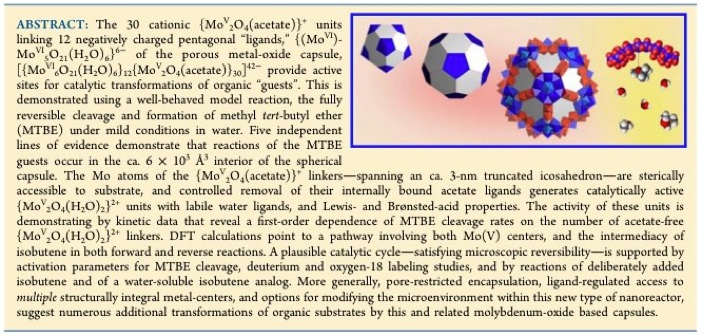
Copyright by the American Chemical Society
(5) Sharet, S.; Sandars, E.; Wang, Y.; Zeiri, O.; Neyman, A.; Meshi, L.; Weinstock, I. A. "Orientations of Polyoxometalate Anions on Gold Nanoparticles", Dalton Trans. 2012, 41, 9849-9851.
Cryogenic transmission electron microscopy of polyoxometalate-protected gold nanoparticles reveals that the Preyssler ion, [NaP5W30O110]14-, lies "face down" with its C5 axis perpendicular to the gold surface, while the Finke-Droege ion, [P4W30Zn4(H2O)2O112]16-, is "tilted", with its long axis close to 60 from the normal to the surface.
Selected as a "Hot Article" and written up in Dalton Transactions, blog by Jeniffer Newton.
Highlighted on the inside cover of the Journal:
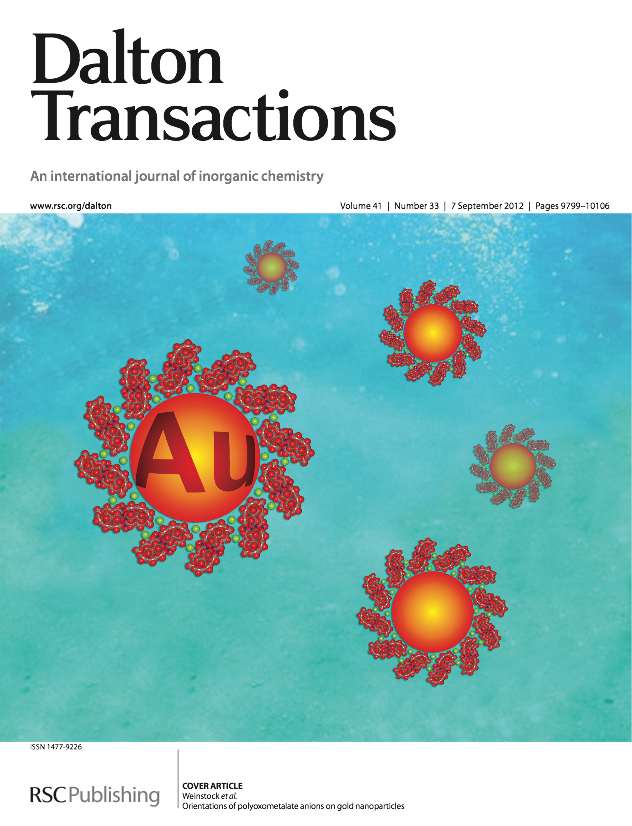
(6) Wang. Y.; Zeiri, O.; Sharet, S.; Weinstock, I. A.* "Role of Alkali-Metal Cations Size in the Self-Assembly of Polyoxometalate-Monolayer Shells on Gold Nanoparticles", Inorg. Chem., 2012, 51 (14), pp 7436-7438.
Cryo-TEM images and UV-vis spectroscopy show that electrostatic interactions between polyoxometalates (POMs) and structurally incorporated counter-cations control the self-assemly of POM-monolayers on gold nanoparticles. In the graphic, caesium cations are used to "manufacture" Preyssler-ion ligand shells on 14-nm gold nanoparticles in water.
Highlighted on the front cover of the Journal:
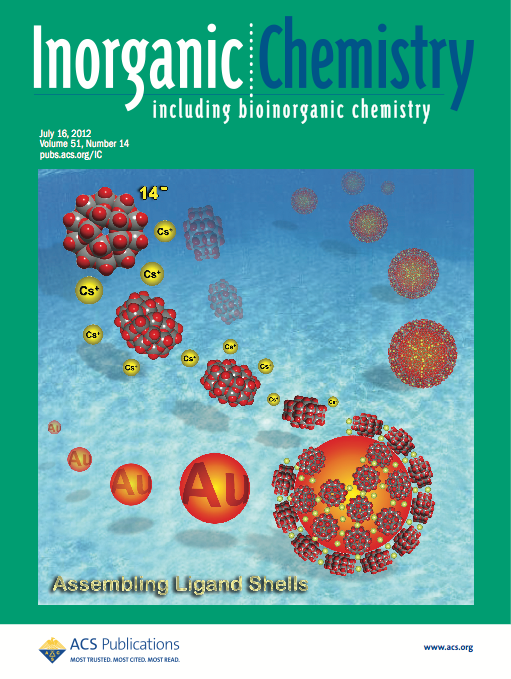
(7) Wang, Y.*; Weinstock, I. A.* "Cation mediated self-assemly of inorganic cluster-anion building blocks", Dalton Trans. (Invited Perspectives Article), 2010, 39, 6143-6152.
In this "Perspectives" article, we highlight the role of cation-anion interactions in the formation and structure of newly documented POM monolayers on metal nanoparticles, abd establish a unifying principle for better understanding the self-assemly of diverse supramolecular structure from highly charge molecular-ion building blocks.
Highlighted on the front cover of the Journal:
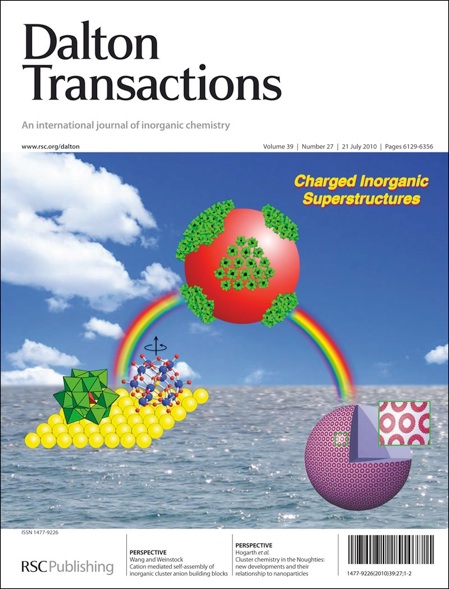
(8) Ziv, A.; Grego, A.; Kopilevich, S.; Zeiri, L.; Miro, P.; Bo, C.; Müller, A.; Weinstock, I.A.* "Flexible Pores of a Metal-Oxide-Based Capsule Permit Entry of Comparatively Larger Organic Guests", J. Am. Chem. Soc. 2009, 131, 6380-6382.
Highlighted on the cover of The Journal of American Chemical Society, Volume 131 (18), May 13, 2009.
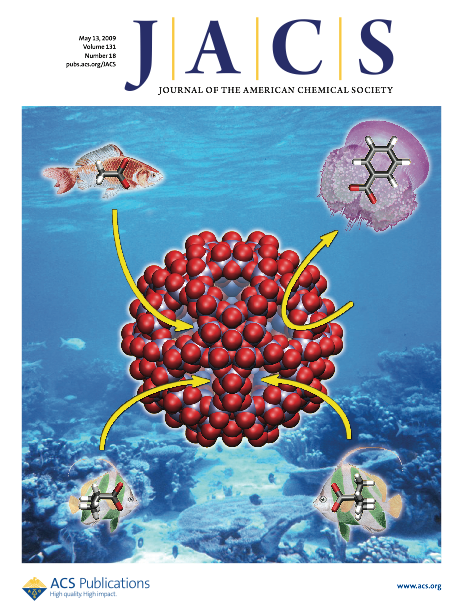
Highlighted in Chemistry World, "Capsules with flexi-pores open wide", March 19, 2009; Chemical and Engineering News, "Inorganic oxides maintain a flexible attitude" 2009, 87 (14), 26-27 (April 6, 2009).
JACS Beta Image Challenge and Enhanced Cover-Art Podcast #11
Artwork by Pere Miro. All rights reserved by the American Chemical Society